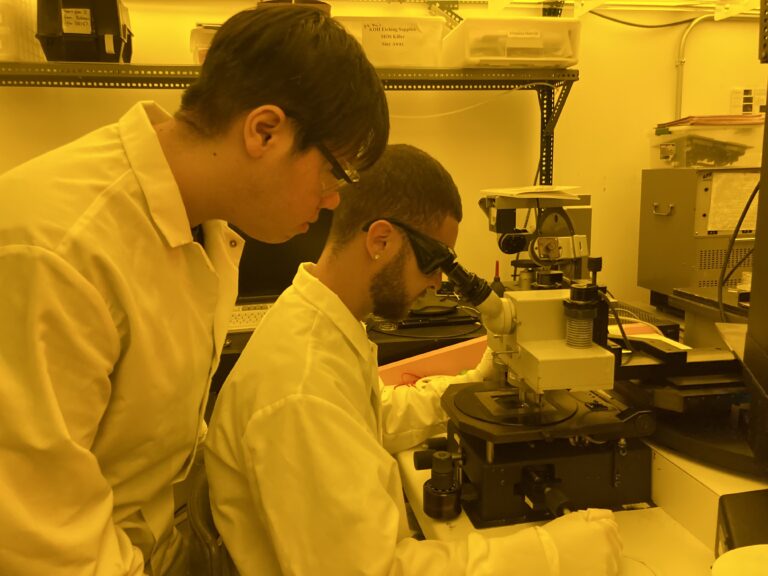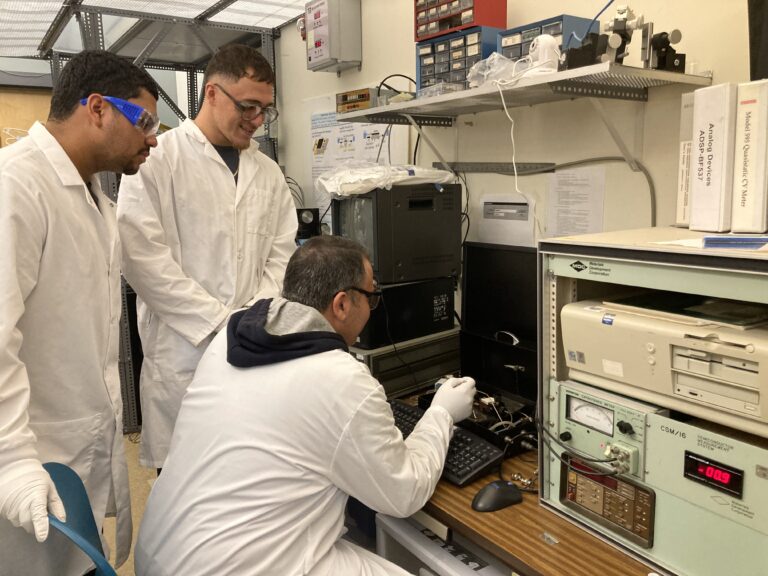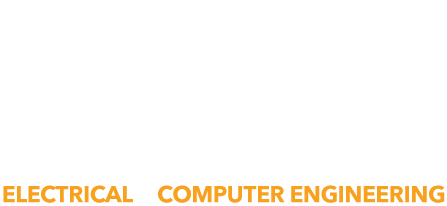- Homepage
- >
- Undergraduate Program
- >
- Undergraduate Research Opportunities in Electrical and Computer Engineering Fall 2024
Undergraduate Research Opportunities in Electrical and Computer Engineering Fall 2024

Undergrad students Chengluo Lin and Kevin Medeiros work with the mask aligner in Dr. Faquir Jain's lab.

Steison Ruiz and Devon Rojas (UG) work with Fatih Bayansal (Grad) on C-V test set for MOSFETs.
Biosensors (Faquir Jain)
Student who is familiar with microprocessors and Python for smart watch for biosensor interface for healthcare
Cyber-Physical Intelligence for Smart Grid Resiliency Lab (Junbo Zhao)
Students who are interested in power and energy systems and with a background in power systems, optimization, AI, and control.
- Power system modeling, estimation, uncertainty quantification, and cybersecurity;
- Power system dynamics and stability control with renewable energy;
- Big data analytics and machine learning for the smart grid;
- Power distribution system/microgrid estimation, learning, and control with high penetration of DERs.
Laboratory of Intelligent Networks and Knowledge-perception Systems (Shalabh Gupta)
I take undergrad students usually on independent studies where they do many tasks related to: data collection and visualization from sensor network, software development for robotics related tasks, conducting both simulation and real experiments for testing path planning algorithms, and also hardware development.
Nanoelectronics Laboratory (Ali Gokirmak and Helena Silva)
We work at the intersection of material science, physics and electronics. Our current focus is on phase change memory devices, Ovonic threshold switches, field effect transistors (FETs), electro-thermal processes, electronic and thermal transport at small-scales (nanometer to micrometer scale).
Undergraduate students in our laboratory (1) perform electrical experiments on nanoscale devices and thin films, (2) deposit thin films and fabricate devices and test structures, (3) construct numerical models using COMSOL Multi-physics and conduct computational analysis.
Several of our undergraduate students have had their research published in leading conferences and journals.
Apply for a position in the Nanoelectronics Lab here
STEM Research (McNair Scholars Program)
Recruitment for Scholar begins in Sept, due in Oct; students must be 2nd or 3rd year students and they pursue undergrad research for all remaining semesters until graduation. The McNair Program helps the students establish a project mentor plus we have year-round 1:1 progress conversations with the McNair office, year-round professional development, a spring semester course about academic writing and research communication, and an intensive summer research, graduate school preparatory program for students to focus on M.S. and Ph.D. application preparation.
Recruiting for Apprentice begins in Jan, due in Feb; students must be 1st or 2nd year students and they pursue a fall semester research apprenticeship (at the start of their 2nd or 3rd year). The McNair Program establishes the project mentor for the students (with their insight about their interests) and they shadow on projects with that group for 3-6 hours weekly, plus we have multiple 1:1 check-ins throughout the semester with the McNair office and a fall semester course as a community about the foundations of research, writing, summer internships, what is graduate school. This program helps students recognize if they want to continue with a research project and they can apply for McNair Scholar this same semester they are participating as an Apprentice. Students do not have to apply for McNair Apprentice before applying to be a McNair Scholar
v Contact renee.gilberti@uconn.edu with any questions on the McNair Scholars Program
Storage and Network Systems Lab (John Chandy)
Research work in storage systems, cybersecurity, reconfigurable computing, and high-performance computing. Students should have C programming experience and familiarity with Linux.
Cyber & Systems Optimization Lab (Krishna Pattipati)
US citizen students to work with my graduate students on combinatorial optimization and machine learning problems related to:
- Multi-objective, Multi-agent Approximate Dynamic Programming algorithms for Ship/UAV/UUV routing
- Collaborative AI
- Implementing machine learning algorithms
- Prognostics
- Combinatorial Optimization
Programming knowledge in Python/Java/C++ a must.
Sustainable and Renewable Power Lab (Zongjie Wang)
Research opportunities in theoretical and numerical analysis in transmission, distribution, and coordinated transmission & distribution systems. Students should have good skills in codings at Matlab or Python with optimization algorithms (e.g., Gurobi).
Wireless Communications Research Lab (Shengli Zhou)
Research opportunities in wireless communications and networks with emphasis on implementation on software defined radio (SDR) platforms and performance prediction with machine learning tools.

